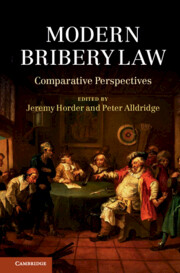Book contents
- Frontmatter
- Contents
- List of contributors
- Table of cases
- Table of statutes and international instruments
- Introduction
- Part I Bribery law: between public wrongdoing and private advantage-taking
- Part II Bribery without borders: tackling corruption in the EU and beyond
- 4 Bribery in Italy: an outlook on present laws and perspectives on reform
- 5 Development, business integrity and the UK Bribery Act 2010
- 6 The aims and limits of European Union anti-corruption law
- 7 Deterring bribery: law, regulation and the export trade
- Part III Ill-gotten gains: the challenge of prosecution, enforcement and asset recovery
- Bibliography
- Index
7 - Deterring bribery: law, regulation and the export trade
from Part II - Bribery without borders: tackling corruption in the EU and beyond
Published online by Cambridge University Press: 05 May 2013
- Frontmatter
- Contents
- List of contributors
- Table of cases
- Table of statutes and international instruments
- Introduction
- Part I Bribery law: between public wrongdoing and private advantage-taking
- Part II Bribery without borders: tackling corruption in the EU and beyond
- 4 Bribery in Italy: an outlook on present laws and perspectives on reform
- 5 Development, business integrity and the UK Bribery Act 2010
- 6 The aims and limits of European Union anti-corruption law
- 7 Deterring bribery: law, regulation and the export trade
- Part III Ill-gotten gains: the challenge of prosecution, enforcement and asset recovery
- Bibliography
- Index
Summary
“We’ve got to have rules and obey them. After all, we’re not savages. We’re English, and the English are best at everything.”
(William Golding, Lord of the Flies, ch. 2)The Bribery Act 2010 (‘the 2010 Act’) deserves critical attention by virtue of at least three of its key features. There is the wide-reaching new offence of failing to prevent bribery (section 7(1)), the collapsing of the distinction between public and private sector bribery (sections 1–5), and the wide extraterritorial application of the law (section 12). These features will form part of the background to the discussion here. My concern will be the impact these changes will have on UK businesses that trade – often through subsidiary companies or agents – overseas. My specific focus will be the impact of the new law on the arms trade, where more research and data are available to assist the analysis, and respecting which the greatest controversy concerning overseas trade has arisen. In exploring this concern, I will consider whether the 2010 Act, which seeks to punish and deter bribery (and the failure to prevent it) through the ordinary criminal law, needs further buttressing in the form of regulatory intervention to reduce the risks that bribery (or the failure to prevent it) will be committed. I suggest that we have much to learn from the dominance of regulatory law in the governance of export control. The ‘prophylactic’ character of regulatory legal intervention in that field provides an important example of what could, and should, be done to further the goal of bribery prevention, especially in relation to export trade itself. The absence of such a regulatory infrastructure symbolises a broader failing. The 2010 Act, whatever its legal merits, has not been adequately supported by an unequivocal policy commitment to harness the energies of UK officials at all levels, at home and abroad, in the service of anti-corruption when facilitating the advancement of commerce.
- Type
- Chapter
- Information
- Modern Bribery LawComparative Perspectives, pp. 196 - 216Publisher: Cambridge University PressPrint publication year: 2013
- 1
- Cited by



